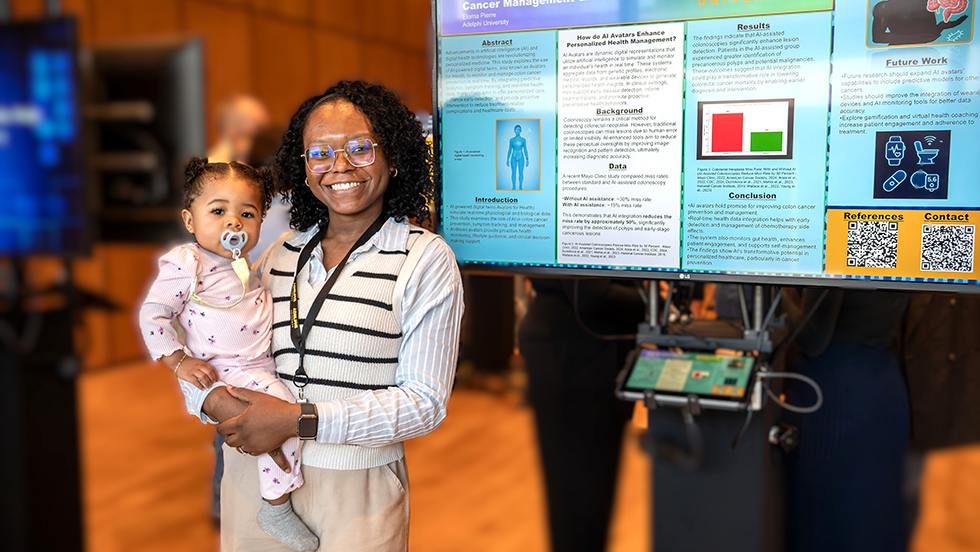
“Breastfeeding my baby. Balancing graduate school. Learning to code. I just completed The Knowledge House Technology Fellowship in Data Science!
This journey reminded me that growth happens in the middle of challenges, not outside of them. Balancing motherhood, graduate school and this fellowship wasn’t easy, but it showed me the power of persistence. I am looking forward to applying these skills to improve healthcare and patient outcomes in the near future.”
This quote, recently shared on LinkedIn by Adelphi University MS in Healthcare Informatics student Elorna Pierre, offers a window into how drive and compassion combined with innovative thinking are powering the next generation of healthcare professionals to grow their knowledge and make a positive impact on patients.
We interviewed Elorna to learn more about what she hopes to get out of her studies in the Adelphi University College of Nursing and Public Health, how becoming a mother has changed her perspective and goals, and about her research that crosses technology and healthcare to address a healthcare topic that hits home.
Q. Thanks for agreeing to share your story with us, Elorna. Can you tell us about yourself and why you decided to continue your education at Adelphi in healthcare informatics?
A. I earned my Bachelor of Science in Biology from Mercy University, where I discovered my passion for understanding how health and disease affect people’s lives. Working in healthcare showed me just how wide the gap between patients, providers and technology can be and how it can affect care. I saw how communication barriers, limited access and outdated systems can have real consequences, especially for underserved communities. Those experiences made me realize I wanted to do more than provide care. I wanted to help design systems that make healthcare smarter, more compassionate and more human. That led me to pursue my master’s in healthcare informatics at Adelphi University, where I am learning how to use data and technology to create real change.
Q. How has being a mom impacted your experience as a student and the goals you set for yourself?
A. Becoming a mother changed everything. It gave me purpose, strength and perspective. Balancing school, internships and parenting is not easy, but my daughter motivates me every day. She reminds me that what I do matters, that my dreams are worth chasing and that I can show her what resilience and determination look like. Motherhood has also made me a more empathetic student and future healthcare professional. I now see every patient as more than a chart or a number. Behind every statistic is a person, a story and someone who deserves care and compassion.
Q. The research you presented at Adelphi’s 2025 Scholarship and Creative Works Conference explored a relatable and beneficial way to utilize AI, which is a popular news story at the moment. What was your research about, and what inspired it?
A. My research, “Avatars for Health: AI-Driven Colon Cancer Prevention and Management,” is deeply personal. It was inspired by my mother’s fight with colon cancer and my desire to make a difference. I explore how AI-powered digital twins, or avatars, can help detect cancer earlier, track treatment and give patients in underserved communities a better chance at prevention and survival.
Cancer symptoms such as nausea, immune suppression, weight loss, etc., require continuous monitoring, medication adjustments and lifestyle management. “Avatars for Health” incorporates gamified challenges, augmented reality interactions and daily health quests to increase engagement, promote adherence to healthy behaviors and close the gap between technology and human-centered healthcare. Through pilot programs and user engagement analysis, the study explores the potential of AI-driven digital twins to reduce the financial burden of healthcare costs, improve population health outcomes and revolutionize access to tailored healthcare solutions.
Presenting this work at Adelphi’s Scholarship and Creative Works Conference was one of the most meaningful moments of my journey. Standing there, sharing this story, reminded me that technology combined with empathy can truly change lives.
Q. In addition to your experiences with healthcare informatics at Adelphi, you recently completed a fellowship and have a great internship. How are all of these elements helping you work toward your career goals?
A. This year, I completed a Data Analytics Fellowship with The Knowledge House, where I learned to use Python and data visualization to turn information into insights that can guide real-world healthcare decisions. I am now interning with the Michigan Health Information Network, learning how data flows across systems to improve patient care. These experiences have helped me connect what I have learned in the classroom to practical solutions that can make a difference. My goal is to continue building digital health tools that reduce disparities, promote equity and help people take control of their health.
About the Master of Science in Healthcare Informatics
The Bureau of Labor Statistics projects a 16 percent growth in healthcare informatics employment through 2032, due partly to the increased use of electronic health records and the enormous amount of data being produced by both people and systems.
The Master of Science in Healthcare Informatics in the Adelphi University College of Nursing and Public Health is the first CAHIIM-accredited health informatics master’s program in New York, teaching both healthcare and nonclinical professionals to transform medical data into valuable insights that improve patient care.
All theoretical coursework for the MS in Healthcare Informatics is completed online, allowing flexibility for working professionals to balance their studies with their careers and personal lives. Students also complete a 100-hour practicum experience with a healthcare organization or related company, either remotely or in person. Faculty and staff provide guidance and support throughout placement to ensure that the practicum aligns with each student’s professional goals and program requirements. This experiential component enables students to apply theoretical knowledge in real-world professional settings and is essential to the degree program.
Explore the MS in Healthcare Informatics curriculum and request more information here.